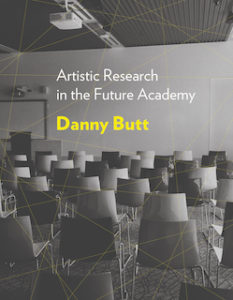Artistic Research
in the Future Academy
A new book by Danny Butt out now on Intellect/University of Chicago Press
About the Book
The rapid growth of doctoral-level art education challenges traditional ways of thinking about academic knowledge and, yet, as Danny Butt argues in this book, the creative arts may also represent a positive blueprint for the future of the university. Synthesizing institutional history with aesthetic theory, Artistic Research in the Future Academy reconceptualizes the contemporary crisis in university education toward a valuable renewal of creative research.
With wonderful lucidity Danny Butt takes us into the heart of a proposed solution for a non-existent problem; the invention of the research led artistic dissertation as a discovery of knowledge. Butt not only exposes the ties that bind this problem to the entangled neo-liberal world, but also refuses to indulge in a restitution of the old regimes, or any imaginary exit from institutional frameworks. Instead, he carefully and sagely explores the third option: the capacity for art to re-set the parameters of knowledge production.
See the launch!
Artistic Research in the Future Academy was launched at Goldsmiths College, University of London on August 16 and in Melbourne at ACCA on October 24 2017. The talk “How Artistic Research Ends” is below, with an introduction from Professor Nikos Papastergiadis and responses from Professor Barbara Bolt and Professor Ashok Mathur.
Order or request an exam copy from University of Chicago Press

You can also find the book on Amazon and via The Book Depository.
The scholarship evident in the manuscript is first class given the very comprehensive negotiation of the available secondary literature on the subject, and most significantly, its lucid and well-informed discussion of the prevailing debates relating to this topic.
One is immediately interested in reading the manuscript because of its sustained cogent and overall grasp of the fundamental contents and ideas discussed. As a manuscript one never loses interest in reading it from it opening chapter to its conclusion. It is immensely relevant, readable and informative in its overall arguments salient to the subject at hand.
It is, in essence, excellent not only in its authoritative grasp of the subject at hand but also because of its crystal clear non-jargon language and style.
Artistic Research in the Future Academy brings together an outstanding level of scholarship, with rigorous referencing, so essential in such a discursive enterprise with speculative and original thinking. It was also intellectually refreshing to read a manuscript, where the author is able to draw with authority on a complex historical and theoretical scaffold to support the arguments [...] Along with publications such as Art Practice as Research: Inquiry in Visual Arts by Graeme Sullivan and The Routledge Companion to Research in the Arts by Michael Biggs and Henrik Karlsson, the publication of Artistic Research in the Future Academy will be an important and timely addition to the literature.
9 Reasons to Read Artistic Research in the Future Academy
A primer on artistic research
Contains a clear summary of the debates on artistic research in Chapter Three.
A historical perspective
Chapters One and Two provide concise histories of the development of the Anglophone University and of university-based art schools
A critique of scientific knowledge
Chapter Four describes the limits of scientific knowledge and the social forces applying pressure to science's privileged role as a way of knowing.
A defense of artistic knowledge
A theoretically-informed defense of artistic knowledge in opposition to exegetical/explanatory knowledge and scientific genres of writing
An update on Kantian aesthetics
Chapter Five mounts a contemporary reappraisal of Kant's conception of aesthetics and critique, articulating this to the history of institutional critique in the visual arts
A critique of Derrida's "University Without Condition"
The conclusion hosts a brief critique of Derrida's famous essay "The University Without Condition" in light of contemporary student-led struggles for the university
A raft of amusing anecdotes
Did you know 17th century most professors at the world-leading University of Edinburgh did not get paid but used their 6 months of teaching to promote publishing and consultancy careers?
A political economy of institutional transformation
A thorough analysis of the social and economic forces driving the growth, expansion and decline of English speaking universities.
A readable book
"One never tires of reading it" claims a manuscript reviewer: it places some of the more obscure intellectual justifications underpinning contemporary arts education into a readable package
About the Author
Danny Butt is Associate Director (Research) at Victorian College of the Arts, University of Melbourne where he coordinates programmes in social practice and community engagement. He is a member of Auckland-based artistic collective Local Time, whose site-specific works engage the dynamics of visitor and host in the context of indigenous self-determination. You can read more about Local Time in the Journal of Artistic Research.
Danny has worked as an academic in art and design schools for two decades – from 2007-2012 he taught in Critical Studies at the University of Auckland’s Elam School of Fine Arts, in the National Institute of Creative Arts and Industries. Prior to that he worked as a partner at Suma Media Consulting, on new content developments in the creative sector, and on Asia-Pacific ICT-for-development and Internet Governance projects funded by UN agencies.
He lives, works and surfs in Boon Wurrung territories in the lands now known as Australia with his partner Ruth DeSouza. You can follow him on Facebook <https://www.facebook.com/buttdanny> and Twitter @djaybutt.

You can preview the Introduction, and Chapter Three is available as an Open Access chapter via Intellect's Author Fund.